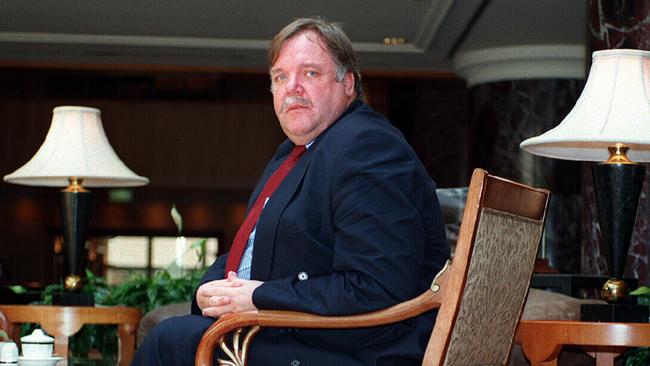David Banks: convivial giant of journalism helped reinvent industry from Fleet Street to Australia
David Banks was once deputy editor of The Australian, but he was more at home in the fiercely competitive world of London’s tabloids.

Arthur David Banks
Journalist. Born Warrington, England, February 13, 1948.
Died Northumberland, England, February 22, aged 74.
-
David Banks was larger than life, but his Sydney doctor wanted him to be much smaller. It was 1988 and we were at Holt Street in Surry Hills at News Corp’s headquarters heading out to lunch. Banks liked lunch. He turned to me in the lift. “Howie, what do you weigh?” I said I wasn’t sure. “About nine stone (around 60kg) I guess,” I said, replying in the imperial measure those of our vintage preferred. Banks was aghast: “Christ, I’ve just been told to lose one of you!”
He did lose weight. Not sure how. But it was nothing to do with lunch.
Banks was big and loud and from a gifted and extrovert generation of editors who were shaped by, and then changed, Fleet Street, which back then was shorthand for Britain’s newspaper industry.
In the mid-1980s we worked together in a small team that trained in computer typesetting in the US, studying at newspapers in Boston, Chicago, Philadelphia and Minneapolis before returning to play a role in bringing about the end of “The Street” with the introduction of what was laughably called “new technology” and that had been resisted by London’s militant print unions for decades.
This was an extraordinary roll of the dice by Rupert Murdoch that changed newspaper publishing and in those first days the so-called Dirty Dozen, led by Banks, moved about from newspaper to newspaper effectively putting them out. In the morning we’d work on the News of the World, by the afternoon we were on The Sunday Times. The next day it would be The Sun. “Bloody exciting, innit?” was the Banks catchphrase that echoed about Wapping in the first months of 1986.
Banks liked noisy newsrooms, making much of the noise himself. He always thought that if you weren’t having fun on a newspaper, you weren’t doing it right.
For years he was understudy to the legendary, and even louder, Kelvin MacKenzie, whose lengthy tenure at London’s The Sun created an era of irreverent brilliance that tabloid newspapers aspired to match, seldom doing so. Both men were fans of ’50s comedian Tony Hancock and could quote slabs of Hancock’s Half Hour. Hancock had a fine line in the absurd and it was this Banks and MacKenzie brought to the newsroom.
The loudest part of the day was when they worked on the front page headline. These were bounced about the backbench as Banks and MacKenzie sought to outdo each other and it is how unforgettable – often daft – headlines sprang to life: “Freddie Starr Ate My Hamster”; or when pop singer George Michael was arrested for lewd behaviour in Beverly Hills, “Zip Me Up Before You Go Go”; and “Up Yours Delors” when European Commission president Jacques Delors pushed for greater political integration across Europe.
“We met (frequently) at the bar of the London Press Club in the early ’70s, me at The Mirror, he at The Express,” recalled Banks, describing them both as ambitious and “rather loud and foul-mouthed”. MacKenzie took Banks to the New York Post where Banks first met Murdoch and was introduced to the art of tabloid news presentation. He worked on broadsheets briefly, including a stint as deputy editor of The Australian in the late ’80s during which he brought to the staff Michelle Gunn, now this newspaper’s editor. He emailed the day after Gunn’s appointment, thrilled at her elevation – and his wisdom.
Banks was given the editorship of The Daily Telegraph where he worked alongside Col Allan who succeeded Banks as editor and worked for a long and legendary stretch himself at the New York Post. “He was a pleasure to work with – well read, funny as hell,” recalled Allan. “He was more than colourful.”
And he remembered that Banks was not just quick-witted, he was agile. When building works at the office disturbed a population of mice once, a lone ranger ran across the news conference desk. Banks rolled up his newspaper, struck and killed it and then held it up by tail, in the manner of a big game hunter. The chief-of-staff lost consciousness and slipped from her chair.
One day, Banks did not return from lunch. He had been called by the chief executive of Mirror Group Newspapers and offered the editorship of London’s Daily Mirror. For a working-class boy from England’s north to rise to such a position once held by Hugh Cudlipp, the most acclaimed of all British editors, was akin to being handed the Crown Jewels.
But it wasn’t the happiest of times; Robert Maxwell, better known today as the father of convicted sex trafficker Ghislaine Maxwell, had bankrupted the newspaper group, even stealing his employees’ superannuation. But Banks was stoic as the newspaper tried to recover.
He had a spell working in radio before spending later years in Northumberland near the Scottish border, writing for the UK Press Gazette, Newcastle’s The Journal newspaper, and a website he co-founded, Voice of the North.
Banks contracted leukaemia in the 2000s but was saved by a stem-cell transplant from his younger brother. Then last year, as Banks put it, both his brother’s cells and those he had donated “turned cancerous”. His brother died last year.
A few days later, underpants Banks had ordered for his brother belatedly arrived. Handily, the brothers were the same size. “They’ll see me out,” wrote Banks.




To join the conversation, please log in. Don't have an account? Register
Join the conversation, you are commenting as Logout